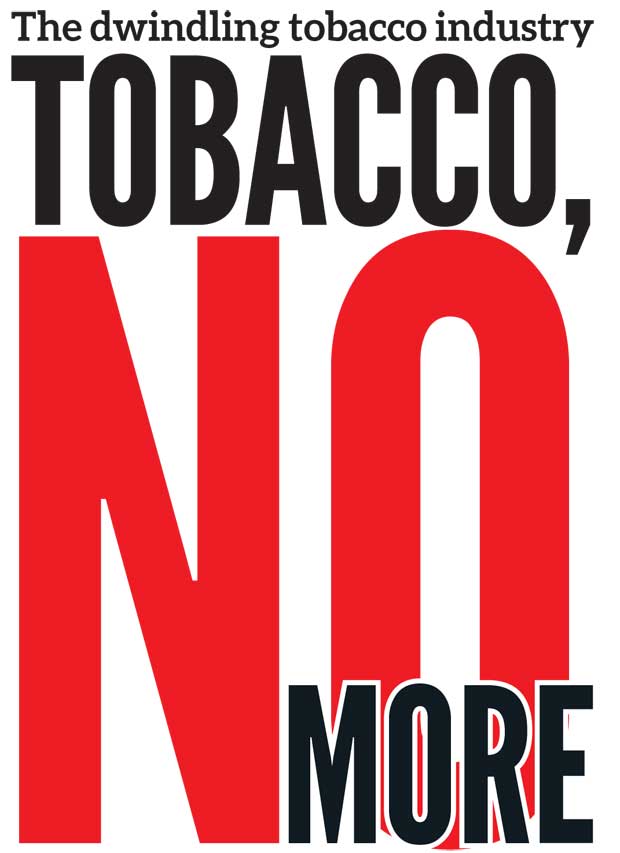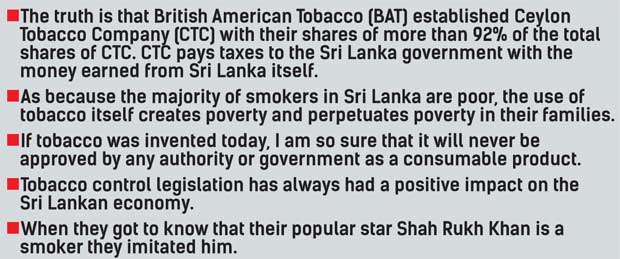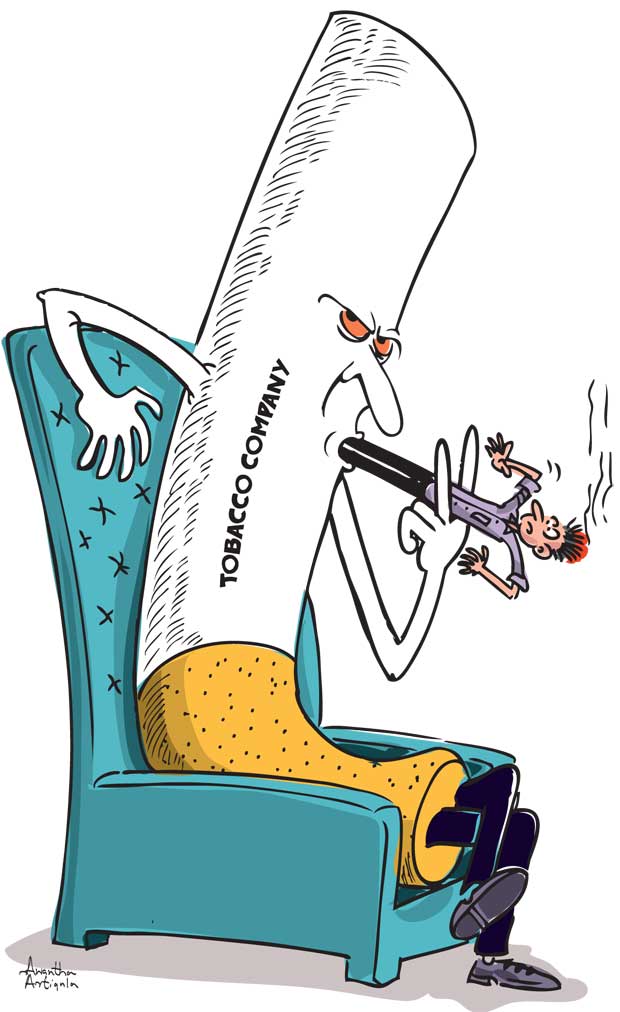20 Jun 2017 - {{hitsCtrl.values.hits}}


I would like to tell that this idea is established and popularized by the tobacco industry as a part of their image building. We can observe some media still trying to interpret it as a true statement although it’s wrong.
The truth is that British American Tobacco (BAT) established Ceylon Tobacco Company (CTC) with their shares of more than 92% of the total shares of CTC. The CTC pays taxes to the Sri Lankan government with the money earned from Sri Lanka itself. But the tobacco industry tries to pretend they pay the tax from their own money. The truth is that this money solely comes from the tobacco consumers in the country while BAT takes 92% of total profit after tax to their mother country  resulting in 92 % of the locally collected profit being absorbed by BAT. It is simple math. Annually, a huge amount of national income is drained to BAT.
resulting in 92 % of the locally collected profit being absorbed by BAT. It is simple math. Annually, a huge amount of national income is drained to BAT.
In comparison with other industries tobacco is not an industry which generates employment, as it is a machine based industry where the use of human resource is minimal. According to a research it was found that if money spent on the tobacco industry was invested in other industries, it will bring more employment opportunities to the country. Further, the World Bank does not approve government incentives for the tobacco industry in developing countries, as they found it useless.
Sri Lanka is a country which invests plenty of money on development of human capital by promoting free education and government incentive systems. Losing human capital in terms of creativity, thinking power and skills due to tobacco use is a huge loss to a country as it is found that most people dying from tobacco related illnesses are in their productive age. Further, tobacco related deaths are untimely deaths and are 100% preventable. So losing human capital on one hand and the work force of the country on the other is a huge economic loss to a developing country like Sri Lanka.
Because the majority of smokers in Sri Lanka are poor, the use of tobacco itself creates poverty and perpetuates poverty in their families. Ultimately we can’t expect any positive impact from an industry which causes a massive cost to a country in all aspects.

It’s a well known fact that the tobacco industry targets the young generation as new users. Although there are various traps to catch young people by the industry, some are very vigilant. We have identified two most successful ways to protect the young generation from this threat. One is by exposing the unethical business strategies that the tobacco industry uses to catch the young generation. If I take a few examples, the tobacco industry pays money for some popular characters who are money oriented and engage them to smoke in public places, in teledramas and films. And most of these popular figures don’t realize that they become lifetime promotional material for the tobacco industry even without getting paid, when they are addicted to smoking. Further, we have noticed that even cartoons which are only designed for children, purposely include scenes of smoking. This clearly violates the child-rights charter.
In the film industry, we find that it offers the bulk of money to include smoking scenes from the top directing level to the bottom level helper. Thereby the industry associates smoking with the coolest attractive things in youth by using attractive figures, symbols and people to allow them to unconsciously absorb the idea that smoking is generalized. In order to do that they sponsor many attractive events like car races to associate the feeling of adventure, risk taking and fearlessness along with smoking. Further smoking is associated with sexual behaviour in films, pictures and all sex videos to ally smoking as a must have part in sexual life, even though well known scientific facts confirm that smoking causes sexual impotence. The industry targets the most sensitive areas of youth life with their ugly strategies in promotion of smoking.
Other possible ways we have identified is to make young people realize that whatever the company or the users say, like the so-called positive outcomes of smoking, these are just an illusion based on psychological phenomenon. All the so-called positive outcomes are just a feeling of conditioning their normal activities. There is no direct link to that feeling with the nicotine in the tobacco. Most of the people believe that smoking conditions other activities of man, which they used to perform perfectly even before they start smoking. As an example some people tell their views on smoking as a habit, and that they can’t go to the toilet without a cigarette. They have forgotten that they performed the same body functions since childhood. Tobacco has anyway disturbed the functions man used to perform without a burden. So we try to make people understand that nicotine never gives the exact thing that the user expects.
Simultaneously I believe that tobacco prevention will be most effective, if Sri Lanka introduces fruitful policy measures in tobacco control. As instances of pictorial warnings on cigarette packs and the high price of cigarette resulted by government tax enforcement, reduced its affordability, this brought about the most effective outcomes in the reduction of tobacco demand in Srilanka.
Young people should actively be involved in tobacco prevention work, as it gives them a further assurance that they will be prevented from smoking in the future.
We can’t directly say what is most harmful. Anyway, smoking is harmful and it affects differently on different people. So comparing the damage caused by different types of smoking is of no use, as everybody has a right to live in a clean environment.
If tobacco was invented today, I am so sure that it will never be approved by any authority or the government, as a consumable product. This is due to its high economic, social, health, and environmental cost. .Further, tobacco cultivation uses very high amounts of insecticides and pesticides, which cause many health hazards, including chronic kidney disease in Sri Lanka.
As I explained to you in the previous question regarding revenue issue and employment opportunities, it has no base.

According to my knowledge there are no harmless electronic or any kind of cigarette invented.
Addiction to cigarette among the young generation is mainly psychological. When they got to know their popular star Shah Rukh Khan is a smoker they imitated him. With that initiation to smoke, after continuous use for sometime, it makes one to feel uncomfortable in the absence of smoking. When smoking becomes a habit for someone, their normal behaviour becomes disturbed due to cigarettes. Then they make it an excuse to use cigarettes to return to normal. The industry knows this psychological phenomenon and purposely put people into this illusion, saying that the cigarette will make their lives better.
Tobacco control legislation has always resulted in a positive impact on the Sri Lankan economy and it has never yielded negative impacts. The latest tax increment also resulted in an increase of government revenue. Not only the government, it is a fact that the tobacco industry has also increased their profits with taxes. To make clear tax policies, Sri Lanka is lacking the expertise for the government treasury or while knowing the truth, they are purposely provide wrong information to policy makers. As an example, the information in the white paper sent by the consultants of the finance ministry are mostly wrong and misleading. I should say it’s worth for all of you to understand how policy makers are misled by consultants.
Our idea is that there should be a transparent formula to decide the amount of tax on tobacco by parliament, as for many other commodities that existed in the market. Further, just like other countries we should go for banning of the selling of single cigarettes.
Moreover, when tobacco cultivation is minimized in the country, farmers are no longer exploited by the tobacco industry to act in the forefront, in government regulations against the industry. Government has already decided to stop growing tobacco due to heavy erosion of soil caused by tobacco cultivation. This will protect the children of tobacco farming families from the risk of lung disease.
It will definitely be closed down due to many reasons. First every country is taking policy decisions to minimize tobacco use worldwide. As evidence, 180 parties have signed the WHO Framework Convention on Tobacco Control worldwide at present.
Secondly, smokers understand that the industry has fooled them for a long time. As for every consumable product there should be correct information provided with the pack .But the tobacco industry is unable to fulfill it .So the consumers’ quitting rate of cigarette use is increasing.
Thirdly, the potential customers have understood that the industry is cheating them and trapping them into smoking. People are more aware of industry strategies than before.
Fourthly, the media has also understood that the industry tries to promote cigarettes in the face of false news.
Finally people working in the industry also have begun to realize the they also have been fooled by the employer to remain in the industry.
30 Oct 2024 29 minute ago
30 Oct 2024 35 minute ago
30 Oct 2024 40 minute ago
30 Oct 2024 2 hours ago
30 Oct 2024 2 hours ago